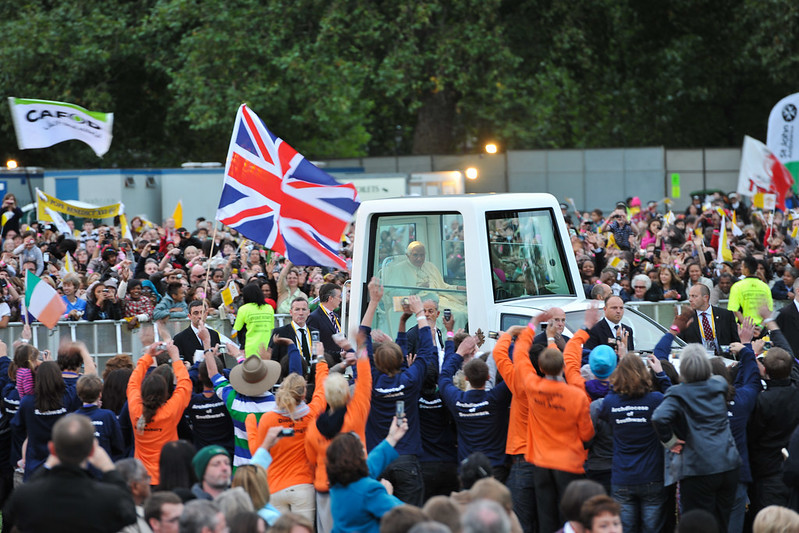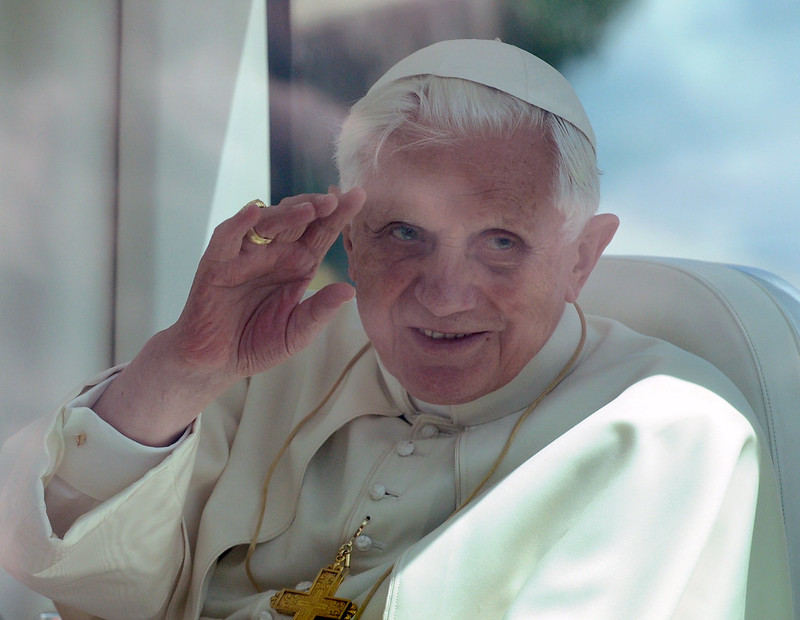Pope Francis will preside at the funeral of Pope Emeritus Benedict XVI, which takes place in St Peter’s Square on Thursday (January 5) at 8am UK time.
The body of the Pope Emeritus has been lying in St Peter’s Basilica so the faithful can pay their respects.
Cardinal Vincent Nichols, president of the Catholic Bishops’ Conference of England and Wales, has paid tribute to Pope Emeritus Benedict, who served as supreme pontiff from April 2005 to February 2013.
He said: “I am deeply saddened to learn of the death of Pope Benedict. He will be remembered as one of the great theologians of the 20th century.
“I remember with particular affection the remarkable papal visit to these lands in 2010. We saw his courtesy, his gentleness, the perceptiveness of his mind and the openness of his welcome to everybody that he met.
“He was through and through a gentleman, through and through a scholar, through and through a pastor, through and through a man of God – close to the Lord and always his humble servant.
“Pope Benedict is very much in my heart and in my prayers. I give thanks to God for his ministry and leadership.”
The Catholic bishops of England and Wales will celebrate Requiem Masses for the repose of the soul of the late Pope Emeritus in their cathedrals.
Prayer cards have also been distributed to Catholic parishes throughout the two countries.
Benedict XVI was Pope for less than eight years – April 19 2005 to February 28 2013 – and w as the second pope in history to visit the UK in 2010.
Speaking in Westminster Hall, Pope Benedict spoke about “the legitimate role of religion in the public square” and pressed the idea that “the Church and the public authorities can work together for the good of citizens”.
He was applauded by then-Prime Minister David Cameron and his predecessors Gordon Brown, Tony Blair, John Major and Margaret Thatcher. The Pope received a standing ovation as he walked down the great length of the hall.
The central purpose of the visit was to beatify the great 19th-century English theologian Cardinal John Henry Newman.
In his homily, the Pope mentioned that the day happened to be the 70th anniversary of the Battle of Britain.
He said: “For me as one who lived and suffered through the dark days of the Nazi regime in Germany, it is deeply moving to be here with you on this occasion, and to recall how many of your fellow citizens sacrificed their lives, courageously resisting the forces of that evil ideology.”
As for Newman, the Pope singled out his “gentle scholarship, deep human wisdom and profound love for the Lord.”
As he had recalled in 1990, he was inspired by Newman’s teaching on conscience as a seminarian at Freising after the war.

Another moment from that visit struck many television viewers was the evening prayer vigil attended by the Pope in Hyde Park the night before the beatification, as 80,000 people prayed in silence before the Blessed Sacrament in such a public place.
There is a website dedicated to Benedict XVI’s visit.
Pope Benedict was baptised Joseph Ratzinger on the day of his birth, April 16 1927 ? Holy Saturday ? at Marktl am Inn, in Bavaria, near the Austrian border. His mother had worked as a cook and his father was a policeman whose criticisms of the Nazis led to the family moving from one small town to another.
In 1943 Joseph was conscripted into anti-aircraft duties and later began training in the infantry. On June 29 1951, he and his brother Georg were ordained priests.
In 1977, came a change in direction for his life, up to then directed towards theology. Pope Paul VI named him Archbishop of Munich and later that year he was made a cardinal.
Three years into his pontificate, in 1981, Pope John Paul appointed Cardinal Ratzinger as prefect of the Congregation for the Doctrine of the Faith, the department of the curia responsible for promoting and defending the Catholic faith.
On April 19 2005, at the age of 78, Cardinal Ratzinger was elected the 265th pope. Commenting on his choice of the name Benedict, he made reference to Pope Benedict XV (1914-22) as an apostle of peace, and to the monastic founder St Benedict of Nursia (480-547) “whose life evokes the Christian roots of Europe”. He was the first German pope in almost 1,000 years.
As a theologian, Ratzinger had long emphasised the role of Judaism in revelation and salvation history.
As pope, Benedict visited Auschwitz in 2006. He said of the Nazis: “By destroying Israel, they ultimately wanted to tear up the taproot of the Christian faith.”
Benedict felt personal pain in contemplating the evil of sexual abuse within the Church. From 2001 he had put the-then Congregation of the Doctrine of the Faith at the service of the campaign to prevent further abuse.
During the Stations of the Cross on Good Friday 2005, days before his election, he had exclaimed: “How much filth there is in the Church.”
In 2010, writing to victims of sexual abuse in Ireland, he said: “I openly express the shame and remorse that we all feel.”
He could only look to the example of Christ: “Like you, he still bears the wounds of his own unjust suffering.”
Nothing in his pontificate took the world by more surprise than his announcing briefly, in Latin, on February 11 2013, that his abdication would take effect at the end of the month. He would, at 85 years and 318 days, be the fourth oldest person ever to be Pope. He had long hoped for peace to study and write, but had repeatedly agreed to new duties laid upon him.
Benedict was to be known as Pope Emeritus, and lived in a house in the grounds of the Vatican. He sometimes met Pope Francis, but he never meddled. He did what he said he would: he prayed for the Church.
Further reading...
Cardinal’s comments and obituary
Obituary in Welsh (Ysgrif goffa Benedict XVI – Cymraeg)
Prayer for the repose of the soul of Pope Emeritus Benedict XVI
Spiritual Testament of Benedict XVI
Cardinal on Papal Visit 2010 and its legacy
His Majesty King Charles III message
Full Archive – All bishops’ messages and up-to-date information

